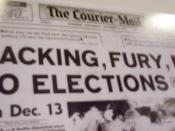The Constitutional Crisis of 1975 is significant to Australian politics today to some extent. The Constitutional crisis involved the breach of constitutional conventions and the eventual dismissal of the Prime Minister.
Many factors are involved in The Constitutional Crisis of 1975. The context of this time was economic crisis of stagflation, a very weak economy with simultaneously rising rates of inflation and unemployment. In December 1972, the Labor party (ALP) was elected for the first time in 23 years with Gough Whitlam appointed Prime Minister. The Senate had a balance of power, where the Opposition and Government held an equal number of seats, 26 each. In April 1974, Opposition leader, Billy Snedden announced that the senate would withhold supply. This triggered a Double Dissolution Election by the Governor General on the advice of the PM, Gough Whitlam. In May 1974, the ALP was re-elected into government. Sir John Kerr was appointed Governor General during July 1974.
It was during 1975 that the Casual Senate Vacancies convention was breached. It led to a hostile senate. In March 1975, Malcolm Fraser displaced Billy Snedden as Opposition leader and it was then in October 1975 that Fraser announced that the Opposition would block supply until an election was called. On November 11th 1975, the GG sacked Gough Whitlam, and Fraser was appointed caretaker government. That day, supply was passed in the senate, and a DD election was called. On November 13th 1975, the L-CP coalition won the election in a landslide victory.
Constitutional Conventions are unwritten constitutional rules of conduct that have strong acceptance and are consciously and consistently followed in practise, but they are not compulsory. In association to the Constitutional crisis of 1975, three conventions were breached. Casual senate vacancies, the senates power to block supply and reserve powers of...


